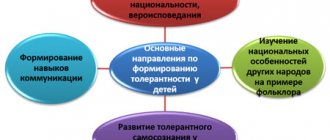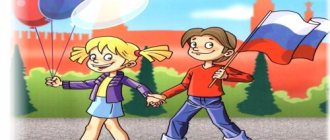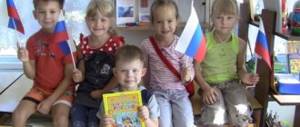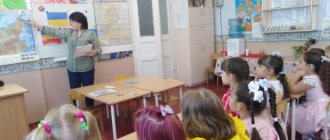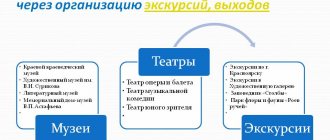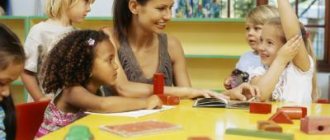K.D. Ushinsky wrote: “Just as there is no man without self-love, so there is no man without love for the fatherland, and this love gives education the sure key to a person’s heart...”
My interests in this work experience are directed to moral values, to the Russian pedagogical heritage and the national culture of our people.
I am confident that already in kindergarten, in senior preschool age, as a result of targeted educational, systematic work, elements of patriotism and civic responsibility can be formed in children. I believe that nurturing the moral and patriotic qualities of a little person is one of the most important tasks in preserving and strengthening the health of children.
Patriotic education is an inseparable part of moral education. A true patriot must be healthy both physically and morally. Consequently, raising a healthy person is closely related to moral, patriotic education and the development of an active citizenship position. In the process of developing a sense of patriotism in preschool age, it is important to instill in children basic knowledge about the Motherland, ideas about our country, people, customs, history, and culture. But at the same time, it is necessary to understand that the origins of patriotism arise in the human heart. That is why preschool age, due to its inherent mental and emotional reactions, due to the still unlost openness of the soul, is most convenient for the formation of such feelings as kindness, love for one’s neighbor and patriotism.
1 slide
Topic: “Moral and patriotic education of preschool children”
2 slide
"Patriotic corners"
Topic: “Our state is the Russian Federation”
Target. Instilling a sense of pride, deep respect and veneration for the symbols of the Russian Federation - the coat of arms, anthem, flag.
Tasks:
1. Develop children’s ideas about the state symbols of the Russian state, their historical origin.
2. Summarize children’s knowledge about the National Flag.
3. Foster respect for the power of the Russian state, love for the Motherland, and a sense of pride in one’s country.
By introducing children to my native country, I expand their understanding of the meaning of state symbols of Russia. I cultivate respect for the coat of arms, flag, and anthem of the Russian Federation. I introduce children to the capital of our Motherland - Moscow and other cities of Russia.
3 slide
"My favorite kindergarten"
Walks and excursions around the kindergarten and its territory. Target walk: “What trees grow on our site.” Riddles about birch, apple tree, flowers: chamomile, cornflower, rose. On a walk, the children look for a tree and must name it. During walks, children get acquainted with the bushes and trees growing on the site. Get an idea of the structure of the kindergarten and the site.
4 slide
"Prom"
This is an annual tradition that ends children's time in kindergarten and they move on to school. On this day, a graduation party is held, where children say goodbye to their teachers and their native kindergarten. They make wishes and release balloons into the sky.
5 slide
“Artistic and aesthetic development. Application "St. George's Ribbon" for May 9"
Fostering patriotism, respect for the cultural past of Russia through the means of aesthetic education: artistic activity, artistic expression.
6 slide
Sports games for Defenders of the Fatherland Day
Patriotic education is an integral part of moral education. A true patriot must be healthy both physically and morally. That is why the education of a healthy lifestyle is closely connected with patriotic education and the education of an active civic position.
It is no coincidence that popular wisdom says: “A healthy mind in a healthy body.”
7 slide
Excursion to the Borisov Nature Reserve “Forest on Vorskla”
Loving your village means loving the nature in it.
Through excursions and walks in the forest, park, field, I instill in children a love of their native nature, consolidate knowledge about plants, different tree species growing in our area, and form a sense of responsibility for preserving the nature of their native land.
8 slide
Laying flowers at the monument, May 9 - “No one is forgotten, nothing is forgotten.”
Target. Consolidating children's knowledge about how the Russian people defended their Motherland during the war years, how the living remember them.
Tasks:
1. Summarize and expand children’s knowledge about the history of the Great Patriotic War.
2. Talk about the heroes of the war, how people honor their memory: poems and songs are composed in honor of the heroes, monuments are erected to them.
Education of a humane, spiritual and moral personality, worthy future citizens of Russia, patriots of their Fatherland.
Slide 9
Creation of a mini-museum of folk antiquities in a kindergarten. "In the Russian upper room."
We continue to introduce children to the home of a Russian person; explain the concept of “upper room”; we talk about its structure; We cultivate interest in the peculiarities of the Russian character and Russian traditions. We develop an interest in Russian applied art - clay and wooden toys; we establish a connection between crafts and the people who made them; We give children the opportunity to feel the joy, love, kindness that these toys bring, the desire to create and create themselves based on Russian folk art.
10 slide
Celebrating the Russian folk holiday "Maslenitsa"
We continue to introduce children to play folklore, which evokes in them an emotional response to music of a cheerful, playful nature. We teach children the perception of Russian folk songs. We cultivate a sustainable interest and instill a love for the song and oral folk art of primordial Rus', touching feelings for the traditions of folk festivals. We continue to introduce children to the nature of the Russian smooth dance - round dance.
11 slide
Exhibition of drawings “Children of Russia - for peace!”
Target. Consolidating children's knowledge about how the Russian people defended their Motherland during the war years, how the living remember them.
12 slide
“Day of the Elderly” - “Our attention and care to grandparents”...
Goal: to cultivate a kind, attentive, respectful attitude towards elders, the desire to help them.
A child's world begins with his family. Preschoolers' understanding of the Motherland is closely related to specific ideas about what is close and dear to them. It begins in a child with his relationship to his family, to the closest people - mother, father, grandmother, grandfather. These are the roots that connect him with his home and immediate environment.
In conversations, children talk about their family, family stories, and traditions. I instill in them a humane attitude towards their loved ones.
Slide 13
Exhibition of crafts for the holiday of May 9, made together with parents.
I try to come to the aid of parents, to involve them in joint activities, the results of which please the children and make them feel proud. It’s nice to hear from a child’s mouth: “My mom and dad made this!”, “We made this together!”
Slide 14
Matinee for the holiday on May 9
Tasks:
Summarize and expand children's knowledge about the history of the Great Patriotic War.
Tell about the heroes of the war, about how the people honor their memory: poems and songs are composed in honor of the heroes, monuments are erected to them.
Author: Galina Nikolaevna Kushnareva, teacher at the Borisov kindergarten “Yagodka”, Borisovka village, Belgorod region, Russia.
The article is published in the author's edition
Presentation “Patriotic education of preschool children” presentation on the topic
Slide 1
Moral and patriotic education of preschool children
Slide 2
Love for your native land, native culture, native speech begins small - love for your family, for your home, for your kindergarten. Gradually expanding, this love turns into love for the native country, for its history, past and present, for all humanity. D.S. Likhachev
Slide 3
Introduction In modern conditions, when profound changes are taking place in the life of society, patriotic education has become one of the central areas of work with the younger generation. Now, in a period of instability in society, there is a need to return to the best traditions of our people, to its age-old roots, to such eternal concepts as clan, kinship, and Motherland. The feeling of patriotism is multifaceted in its content: it is love for one’s native places, pride in one’s people, a feeling of inseparability with others, and a desire to preserve and increase the wealth of one’s country. To be a patriot means to feel like an integral part of the Fatherland. This complex feeling arises even in preschool childhood, when the foundations of a value-based attitude towards the world around us are laid, and is formed in the child gradually, in the course of nurturing love for his neighbors, for kindergarten, for his native places, his native country. Preschool age, as a period of personality formation, has its own potential for the formation of higher moral feelings, which include the feeling of patriotism.
Slide 4
The objectives are to educate the child in love and affection for his family, home, kindergarten, street, city; formation of a caring attitude towards nature and all living things; instilling respect for work; developing interest in Russian traditions and crafts; formation of basic knowledge about human rights; expanding ideas about Russia, its capital; introducing children to the symbols of the state: coat of arms, flag, anthem; developing a sense of responsibility and pride for the achievements of the Motherland; the formation of tolerance, a sense of respect and sympathy for other people, nations, and their traditions.
Slide 5
The principles of constructing work are “positive centrism” (selection of knowledge that is most relevant for a child of a given age); Continuity and continuity of the pedagogical process; A differentiated approach to each child, maximum consideration of his psychological characteristics, capabilities and interests; A rational combination of different types of activities, an age-appropriate balance of intellectual, emotional and motor stress; Activity approach; Developmental nature of learning based on children's activity.
Slide 6
To implement the moral and patriotic education of preschool children, it is necessary: Creation of favorable material, technical and social conditions; Updating the content of education, selecting the most interesting and accessible material based on the experience and feelings of children; Consistent orientation towards cultural conformity of education, designed to ensure the formation of a person’s spiritual world; Close contact on this issue with the family, relying on its traditions and experience.
Slide 7
The system and sequence of work on the moral and patriotic education of children. Patriotic education Hello, it's Me! My family My garden Traditions My country My city
Slide 8
Thematic blocks of work with preschoolers on instilling a sense of patriotism
Slide 9
Block "Hello, it's me!" Formation in children of ideas about themselves as individuals who have the right to individual differences from others. Show variety of names. help the child realize his own individuality, increase self-esteem; understand their own significance in the hearts of their parents (this is especially important for those children whose parents are not prone to displays of excessive tenderness and whose upbringing is strict);
Slide 10
Organized activities Middle group: Round dance games: “Hurry up, Tanya, hide ...”, “Recognize by voice” Leisure “Name day” “Name holiday” Senior group: “Our names” Project “My name” Preparatory group: Didactic exercises: “ Me and the universe”, “Make your own coat of arms” “Album “It’s me!” "Who will I be?"
Slide 11
Block “My Family” Instill in children a sense of pride in their family; cultivate love for home; teach to be more attentive to events in your family, to be interested in the affairs and traditions of your home.
Slide 12
Organized activity Middle group: Getting to know the composition of the family. Designing a family album Didactic exercise “Build a family” Creating a corner of solitude with family photos Celebrating the birthday of a kindergarten Senior group: Projects: “My family”, “Family traditions: leisure, collections” Photo album “One day in our family” Exchange of information between parents Preparatory group: Album “Friendly Family” Projects: “Coat of Arms”, “Family Traditions” Visiting city exhibitions and museums
Slide 13
Block “My Garden” Create a desire to attend preschool, meet friends; cultivate a respectful attitude towards kindergarten staff; instill a caring attitude towards the work of adults, a desire to provide all possible assistance; learn to remember the way to kindergarten, its address; introduce preschoolers to visits to kindergarten, cultivate a desire to maintain order in their group, on their playground.
Slide 14
Organized activities Middle group Photo album “Me and my friends Our birthdays! Senior group Exhibition of children's works "My favorite kindergarten" Album "Route from home to kindergarten" Preparatory group Album with stories "My best friend" Birthday of kindergarten.
Slide 15
The “My City” block introduces children to the history of Peterhof. to instill in preschoolers respect for people of various professions working in the city; give an idea of the city’s transport and its nature; instill interest in the historical and cultural heritage of their people; to form a respectful attitude towards WWII veterans of your home city.
Slide 16
Organized activity Middle group Corner “My City” D/i “Collect a picture” “Lay out a silhouette” Senior group Corner “My Peterhof” “Labyrinths” D/i “Find whose shadow” Preparatory group Corner “I live in Petrodvorets” Album “My beloved Peterhof" Model of the microdistrict Albums for viewing in all age groups
Slide 17
Block “My Country” Introduce the state symbols of Russia. To give knowledge about the country in which we live (cities, nationalities, the wealth of our country, folk art) To introduce a map, a globe. Introduce holidays.
Slide 18
Organized activities Middle group Album for viewing Senior group Album “Cities of Russia” Preparatory group Album “Wide is my native country” Exhibition of drawings “My Motherland - Russia”
Slide 19
Block “My Traditions” To develop children’s artistic taste and creative abilities; to cultivate a sense of pride and admiration for one’s small Motherland with the help of the traditions of the Russian people and through museum pedagogy; instill interest in the cultural values of one’s own and other peoples.
Slide 20
Organized activities Maslenitsa holiday Easter holiday Day of Nahum the Grammar Albums of folk applied art Exhibitions of children's works. Master class on making dolls Introduction to oral folk art
Slide 21
Forms of work with children and their parents: Excursions; Walks; Joint educational activities Holidays and entertainment; Meeting evenings; Hiking trips. Parent meetings Round table meetings Gatherings Subbotniks Consultations Visual campaigning Questionnaires Exhibitions Photo exhibitions Quizzes Creation of albums
Slide 22
Memo for parents Draw your child’s attention to the beauty of your hometown. While walking, tell us what is on your street, talk about the meaning of each object. Give an idea of the work of public institutions: post office, store, library, etc. Observe the work of the employees of these institutions, note the value of their work. Together with your child, take part in the work of improving and landscaping your yard. Expand your own horizons Teach your child to correctly evaluate their actions and the actions of other people. Read books to him about his homeland, its heroes, traditions, and culture of his people. Encourage your child for his desire to maintain order and exemplary behavior in public places.
Slide 23
Conclusion: Patriotism is the constant work of the mind and soul, love and respect for elders, daily efforts to ensure that our common homeland - Russia - becomes more powerful and more beautiful, so that citizens of the Russian Federation, regardless of their nationality, live better and believe in the future of their children and grandchildren. This is respect for the historical past of the homeland and the traditions inherited from it; attachment to place of residence.
Presentation “Patriotic education of preschool children according to the Federal State Educational Standard”
Valentina Korotaeva
Presentation “Patriotic education of preschool children according to the Federal State Educational Standard”
Patriotic education of preschool children according to the Federal State Educational Standard.
Patriotic education is a process of interaction between educators and students , aimed at developing patriotic feelings , the formation of patriotic beliefs and stable norms of patriotic behavior . The goal of patriotic education is to educate a convinced patriot who loves his Motherland, devoted to the Fatherland, ready to serve it with his labor and protect its interests.
Much has been written about the importance of introducing a child to the culture of his people, since turning to the paternal heritage fosters respect and pride for the land on which you live. Therefore, children need to know and study the culture of their ancestors. It is the emphasis on knowledge of the history of the people and their culture that will help in the future to treat the cultural traditions of other peoples with respect and interest.
Patriotic education of children is one of the main tasks of a preschool educational institution. It should be emphasized that quite a lot of methodological literature on this issue is currently being published. Often it covers only certain aspects of the patriotic education of children in specific types of activities, and there is no coherent system that reflects the entirety of this issue. Apparently, this is natural, since the feeling of patriotism is multifaceted in content. This includes love for one’s native places, pride in one’s people, a sense of inseparability with the outside world, and a desire to preserve and increase the wealth of one’s country.
Based on this, in this area of educational work a whole range of tasks can be identified:
- nurturing in a child love and affection for his family, home, kindergarten, street, city;
— formation of a caring attitude towards nature and all living things;
— instilling respect for work;
— development of interest in Russian traditions and crafts;
— formation of basic knowledge about human rights;
— expanding ideas about Russian cities;
— introducing children to the symbols of the state (coat of arms, flag, anthem)
;
— developing a sense of responsibility and pride for the country’s achievements;
- formation of tolerance, a sense of respect for other peoples and their traditions.
These tasks are solved in all types of children's activities: in classes, in games, in work, in everyday life - as they instill in the child not only patriotic feelings , but also form his relationships with adults and peers.
Patriotic education of a child is a complex pedagogical process. It is based on the formation of patriotism as a personal quality.
In a broad sense, patriotism is interpreted as the personification of love for one’s Motherland, active involvement in its history, culture, nature, modern life, its achievements and problems.
Presentation: “Patriotic education of preschool children” presentation for the lesson (middle group) on the topic
Slide 1
MBDOU "Kindergarten No. 18" of the city of Nizhny Novgorod Educator: Sivokhina A.M.
Slide 2
Goal: education of a humane, spiritual and moral personality, worthy future citizens of Russia, patriots of their Fatherland. Objectives: - nurturing in a child love and affection for his family, home, kindergarten, street, city; — formation of a caring attitude towards nature and all living things; — fostering respect for work (the worker, the results of his work); — development of interest in Russian traditions and crafts; — expansion of ideas about the native city of Nizhny Novgorod, about the automobile plant district; — introducing children to the symbols of the state (coat of arms, flag, anthem); developing a sense of responsibility and pride for the country’s achievements; fostering a respectful attitude towards the defenders of the Fatherland, the traditions of the state, and public holidays; the formation of tolerance, a sense of respect for other peoples and their traditions. “Love for your native land, native culture, native speech begins small - with love for your family, for your home, for your kindergarten. Gradually expanding, this love turns into love for the Motherland, its history, past and present, for all humanity.” D.S. Likhachev
Slide 3
Methods of education: teacher's story; observation of changes in the appearance of the native settlement, the work of people in kindergarten; conversations about your hometown, country; display of illustrations of city sights; listening to audio recordings (for example, bird voices of the Russian forest); use of folklore works (proverbs, sayings, fairy tales, learning songs, games); familiarization with folk art products: paintings, buildings, household furnishings, toys; acquaintance with the works of famous poets; organization of thematic exhibitions; participation in public and calendar holidays; participation of children in feasible socially useful work.
Slide 4
THE FEELING OF HOMELAND... The Motherland is the city in which a person lives, and the street on which his house stands, and the tree under the window, and the singing of a bird: all this is the Motherland. Preschool childhood is the most important period in the formation of a person’s personality, when children’s first ideas about the world around them, society and culture are formed. At this age, patriotism is formed. The feeling of the Motherland begins with admiration for what the child sees in front of him, what he is amazed at, and what evokes a response in his soul... Our task is to select from the mass of impressions received by the child those that are most accessible to him: nature and the animal world, people’s work, traditions at home (kindergarten, native region), social events, etc.
Slide 5
MY FAMILY. A child's world begins with his family. Preschoolers' understanding of the Motherland is closely related to specific ideas about what is close and dear to them. It begins in a child with his relationship to his family, to the closest people - mother, father, grandmother, grandfather. These are the roots that connect him with his home and immediate environment. In conversations, children talk about their family, family stories, and traditions. Our group often holds conversations “My Home, My Family,” in which children are told how and why people got their first and last names, family photo albums are prepared, and thematic illustrations are examined.
Slide 7
Gradually, the child became acquainted with the kindergarten, his street, district, city, and then with the country, its capital and symbols. Every city is unique. Likewise, Nizhny Novgorod has its own architecture, its own traditions and way of life, its own history. The selection of appropriate material allows preschoolers to form an idea of what their native land is famous for...
Slide 11
In order to cultivate love for the native land, the plants and animals that inhabit it, to evoke a desire to communicate with nature, to provide all possible assistance in its protection, to form an active position - not an indifferent contemplator, but an active and cultural participant in the process of solving environmental problems, excursions and targeted walks are conducted , observations
Slide 12
Defender of the Fatherland Day. Formation of patriotic feelings based on familiarization with the military traditions of our people, using the example of close relatives: fathers and grandfathers.
Slide 14
Holiday May 9th. Much work is being done to familiarize children with the feat of the Russian people during the Great Patriotic War, with the traditions of celebrating Victory Day.
Slide 16
Layout: "War and Peace". Skvortsov family
